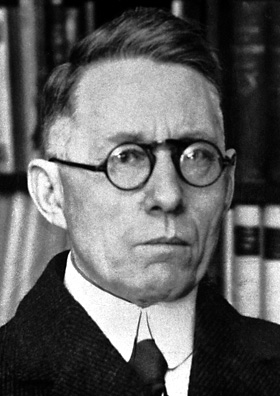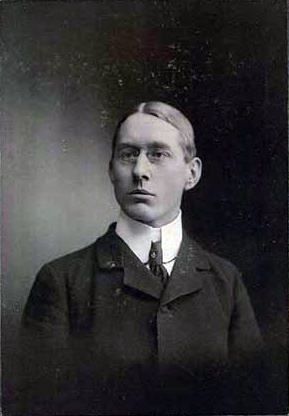Johannes V. Jensen facts for kids
Quick facts for kids
Johannes V. Jensen
|
|
|---|---|
 |
|
| Born | Johannes Vilhelm Jensen 20 January 1873 Farsø, Jutland, Denmark |
| Died | 25 November 1950 (aged 77) Østerbro, Copenhagen, Denmark |
| Occupation | Writer |
| Nationality | Danish |
| Notable awards | Nobel Prize in Literature 1944 |
Johannes Vilhelm Jensen (known as Johannes V. Jensen) was a famous Danish writer. He was born on January 20, 1873, and passed away on November 25, 1950. Many people consider him one of the most important Danish writers from the early 1900s.
In 1944, he won the Nobel Prize in Literature. He received this award because of his strong and creative imagination, his wide-ranging curiosity, and his bold, new writing style. Johannes also had a sister, Thit Jensen, who was a well-known writer and an early supporter of women's rights.
Contents
Early Life and Education
Johannes V. Jensen was born in a small village called Farsø in northern Jutland, Denmark. His father was a veterinarian, a doctor for animals. Johannes grew up in the countryside.
He started studying medicine at the University of Copenhagen. To pay for his studies, he worked as a writer. After three years, he decided to stop studying medicine and focus completely on writing.
Amazing Literary Works
Johannes V. Jensen's early writing showed a bit of a gloomy or serious mood, common at the end of the 1800s. He started his writing career by publishing Himmerland Stories between 1898 and 1910. These were a collection of tales set in the part of Denmark where he grew up.
From 1900 to 1901, he wrote his first major book, Kongens Fald. This book was later translated into English as The Fall of the King in 1933. It's a historical novel about King Christian II. A literary expert, Martin Seymour-Smith, said it showed how Jensen felt about Danish indecision and lack of energy, which he saw as a national problem. It also gave a deep look into people's lives in the 1500s.
In 1906, Jensen created one of his greatest works: a collection of poems called Digte 1906 (meaning Poems 1906). This book introduced a new style of writing called the "prose poem" to Danish literature. He also wrote other poetry, a few plays, and many essays. His essays often explored topics like how humans developed and the ideas behind evolution.
He explored his ideas about evolution in a series of six novels called Den lange rejse (1908–22). This series was translated into English as The Long Journey (1923–24). Many people see this as his most important prose work. It was a bold attempt to tell the story of human development from the Ice Age up to the time of Christopher Columbus, focusing on brave, pioneering people.
Like another famous Danish writer, Hans Christian Andersen, Johannes V. Jensen traveled a lot. A trip to the United States inspired his poem "Paa Memphis Station" (At the train station, Memphis, Tennessee), which is very well known in Denmark. The American writer Walt Whitman was one of the authors who influenced Jensen's writing style.
Later Career and Journalism
Most of Jensen's most popular books were finished before 1920. After this, he spent a lot of time on detailed studies of biology and animals. He wanted to create a system of right and wrong based on Darwinian ideas about evolution. He also hoped to bring new life to classic poetry.
For many years, he worked in journalism. He wrote articles and stories for daily newspapers, even though he wasn't a permanent staff member at any one paper.
Lasting Impact
Johannes V. Jensen was a person who often sparked debates in Danish culture. He was a strong debater, and some of his ideas were seen as questionable. However, he never supported harmful political movements.
Today, Jensen is still seen as the founder of Danish modernism, especially in modern poetry. He brought in the prose poem and used clear, direct language in his writing. His influence was still felt strongly even in the 1960s. He can be compared to writers like Rudyard Kipling, Knut Hamsun, and Carl Sandburg. He combined the perspective of a local writer with the insights of a modern scientist.
In 1999, his novel The Fall of the King (from 1901) was named the best Danish novel of the 20th century by two major newspapers, Politiken and Berlingske Tidende.
A place in Northern Greenland called Johannes V. Jensen Land was named in his honor.
See also
 In Spanish: Johannes Vilhelm Jensen para niños
In Spanish: Johannes Vilhelm Jensen para niños
 | Leon Lynch |
 | Milton P. Webster |
 | Ferdinand Smith |


